Constructed Realities Part II
Or: Angela Orosco is Babygirl
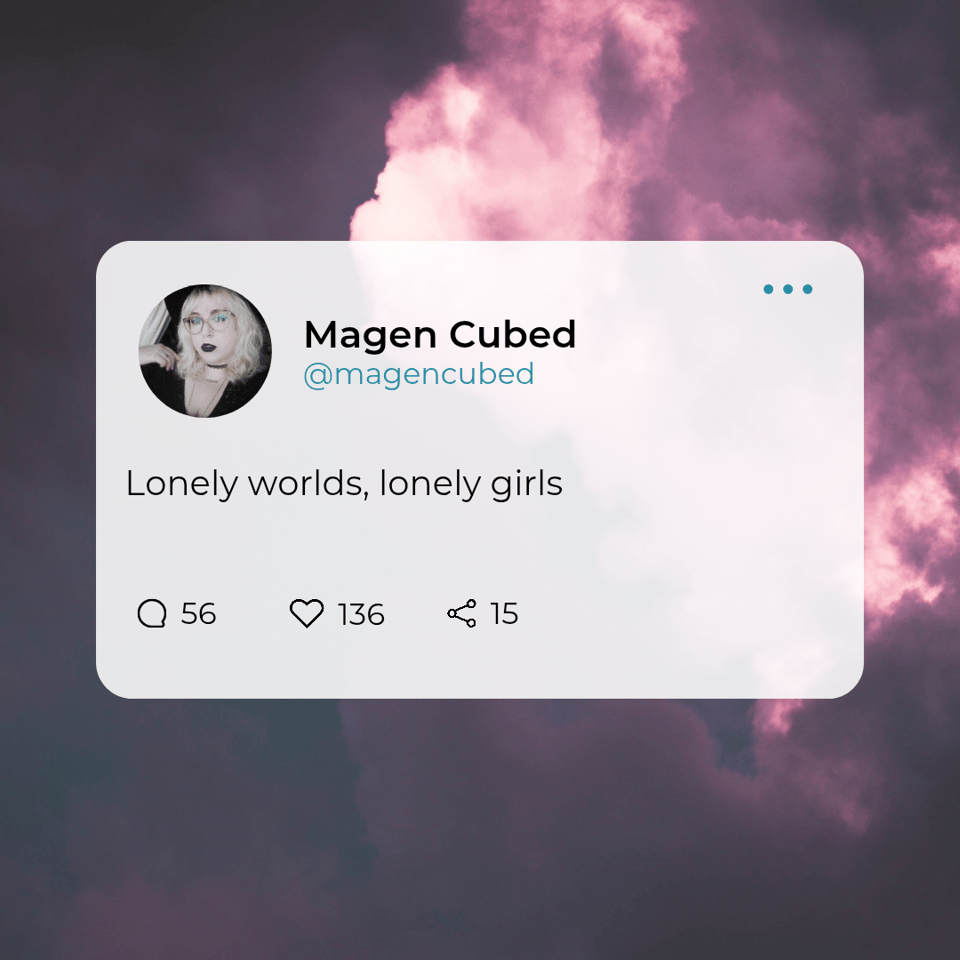
Remember when we found misery
We watched her, watched her spread her wings
And slowly, slowly fly around our room
And she asked for your gentle mind
Misery is a butterfly
Her heavy wings will warp your mind
With her small ugly face
And her long antenna
And her black and pink heavy wings
This is the second part of an impromptu duology of essays I've been turning over in my mind for the last year or so. The theme holding these two essays together, insofar that it accomplishes its mission of duct taping disparate ideas together, is constructed realities. We do like a theme around here.
When we last spoke, I talked at length about living in stories and lonely girls like Monika from Doki Doki Literature Club and Maria from Silent Hill 2. I talked about them so much that I ran out of space to talk about Angela Orosco from Silent Hill 2. That's because Angela is a complication unto herself. Depending on who you ask, Angela is either a perfect example of yet another girl living within a constructed reality, or she calls the whole thing into question as an individual subject who exists outside of and within that reality simultaneously.
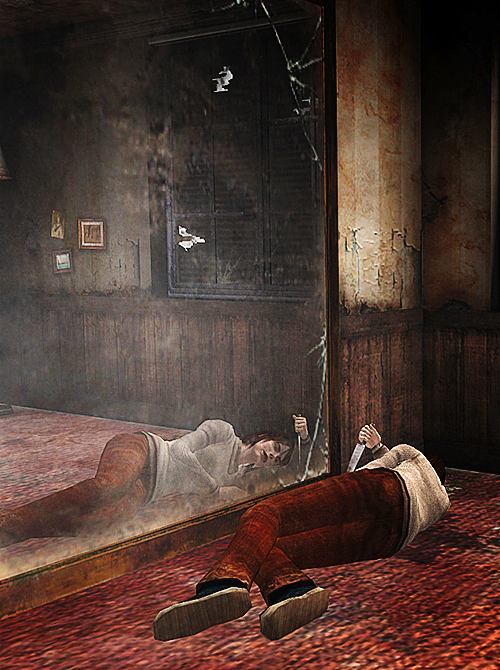
Basically, Angela being real or not isn't quite so simple. She poses a lot of messy questions about James, the town, the dream, his role as the dreamer, our role observing the dream. All of it.
Popular arguments and analysis position Angela either as a figment of James’ tortured imagination or a tragic figure who succumbs to the horrors of Silent Hill under her own propulsion. My own personal take falls outside the dichotomy presented by these two rhetorical poles. I personally don't think these lines of questioning yield satisfying reads of the game and the ideas it's trying to discuss. They're too easy. Too clean.
Angela, for me, makes the game what it is. She is such an important character, both in the world of the game and beyond it, that I've never spoken about her at length. It always felt unnecessary, like remarking upon the color of the sky or the wetness of water. Angela is everything. She did nothing wrong and is, most assuredly, babygirl. We all agree and can now shake hands and feel confident in that undisputable fact.
But following the 2024 remake, and all the renewed discourses that came with it, I was confronted with the fact that Angela isn't as widely understood as I assumed she was.
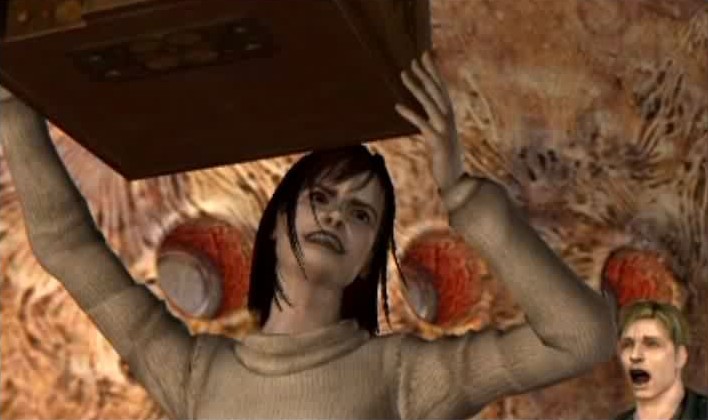
For the record, I'm not speaking of bad faith actors and rage-bait Twitch streamers. The world's most tedious grifters don't get the satisfaction of sucking the oxygen out of this discussion. I'm speaking of good-natured, otherwise even-handed responses from people who mean well. It's precisely because they're acting in good faith that the narrative that's built up in YouTube video essays and forum posts gets to me the way that it does.
It can be summed up in one sentence, a single idea, rephrased and repositioned a dozen different ways by hundreds of different people: Angela Orosco failed to cope with her trauma in a story about guilt, acceptance, and redemption. That's why her story ends the way that it does, through a failure. A lack.
The construction of this reality goes beyond anything that James Sunderland could dream of on his own. That's why I think it's time to talk about Angela and to make the case for why she's so important, beyond James, the dream, and what we make of it.
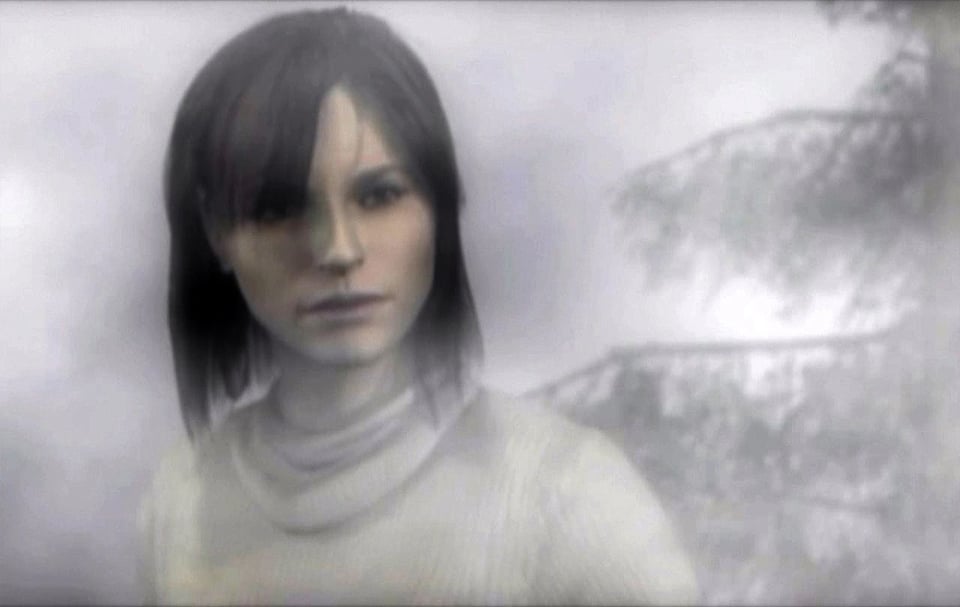
When James arrives at Toluca Lake just outside Silent Hill, Angela is the first person he encounters in Toluca's foggy cemetery. She is gaunt and frail. Her thin face puts her at thirty- or forty-something in a chunky beige sweater, rust-colored jeans, and dirty sneakers. For lack of a better term, Angela is very mom-coded. Very frumpy. In contrast to characters like Maria and the nurses, she moreso visually aligns with the conservatively-dressed Mary.
Angela is inspecting headstones when James happens upon her for directions to the road into town. She's here looking for someone, too, the same as James, and lets out a panicked scream as he interrupts her search. Strange does not begin to describe Angela, played to jarring extremes by Donna Burke in 2001's outing. First apologizing as if guilty of some crime, next she takes a confused, almost mocking tone when James says that he's lost. The erratic vocal performance doesn't match the subdued body language in a way that feels deeply weird.
She next shifts into a more helpful, inquisitive tone to give James directions into town. But there's something wrong with Silent Hill, she warns him. It may even be dangerous. How so, she can't really say, and James cuts her off before she can collect her unspooling thoughts. The conversation changes again as Angela slips into a child's lighter register to say she's looking for “her mama.” She corrects herself to say that her mother is supposed to be in Silent Hill. It's been so long since she's seen her. Her father and brother were supposed to be here, too, but she can't find them.
What she's doing in a cemetery looking for her family, James doesn't ask. Even if James was present of mind enough to question her, it's better to calm her like the startled bird that she is. They briefly connect over their shared search for loved ones. As players, we can safely file Angela away as a friend, albeit one seemingly rattled by grief.
Angela does not haunt the town so much as she sees its true face. Or a truer face, at least. It can be inferred that she lived here or nearby, but her backstory broadly comes from implication and extrapolation. (Yes, there's the official novelization by Sadamu Yamashita to provide supplemental backstory, but I prefer to discuss what's actually in-game.) While Maria was born from Silent Hill and Laura traveled here to find Mary, Angela's relationship appears very different from the outset.
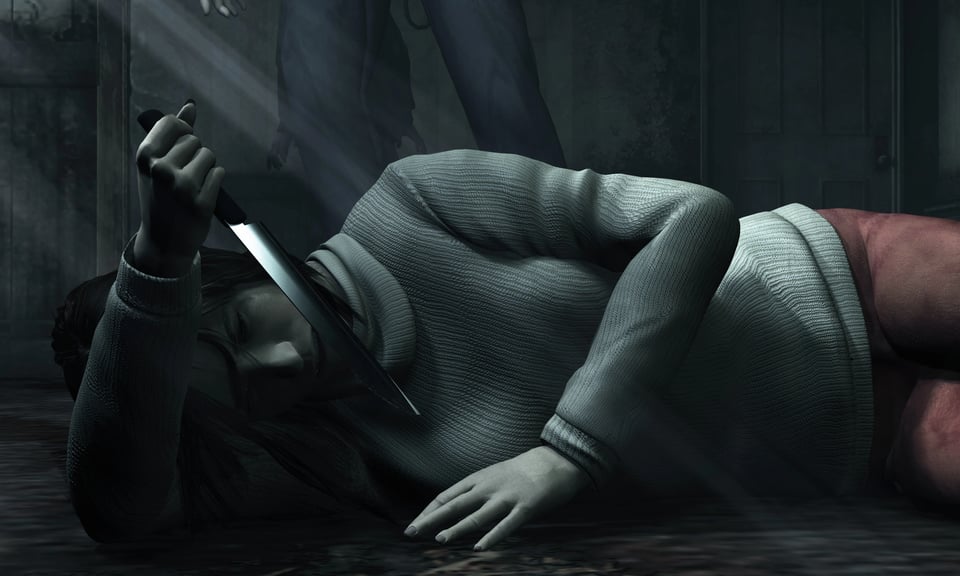
She next appears in the apartment stage of the game in a lonely, dirty room. James finds her lying on the floor and looking at her reflection in the wall-sized mirror. In her hand is a bloodied kitchen knife. James, thinking that she's going to hurt herself, fumbles his way through assurances. There's always another way, after all.
I think it's fair to see a bloody knife in a town overrun with creeping monsters and assume it was used in self-defense. He doesn't, or can't, see it that way. She doesn't remark upon the monsters. As if in a dream, Angela instead toys with her knife and flits between temperaments and intonations. Despondent, afraid, angry, then apologetic for lashing out at James and making seemingly tangential accusations.
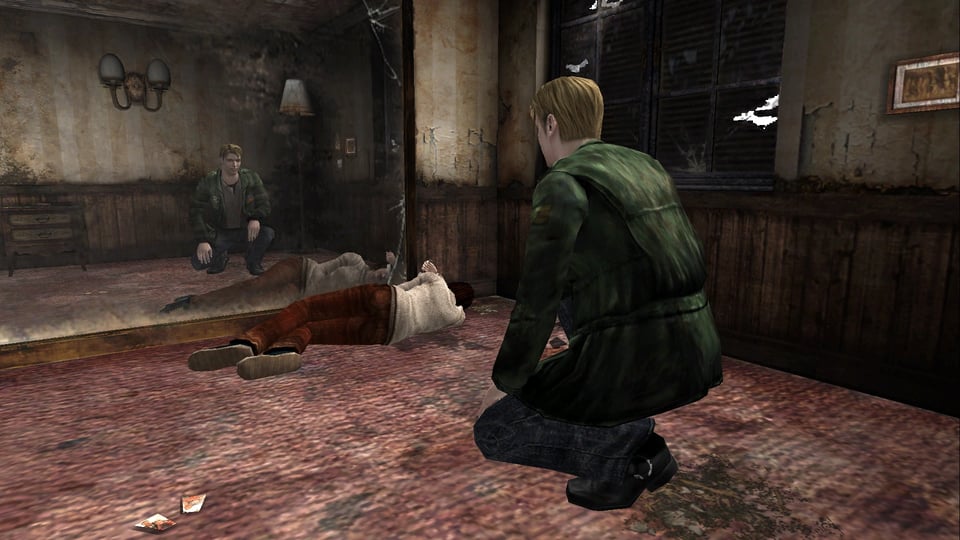
They connect again in their strange ways of speaking, talking around what's happening to them, using disconnected questions and statements. Angela can't find the mother who may or may not be dead. James assures her that he isn't crazy for looking for his dead wife and asks her to come with him. The town is as dangerous as she said. They should stick together.
Suddenly animated from her depressive state, she jumps to her feet to go find her mama. Before she can sprint away, James asks about the knife. Confused, as if remembering she has it at all, Angela sheepishly yields her blade to him. She doesn't know what she'll do if she keeps it. But then Angela screams when James moves in too close, dropping her knife and fleeing in tears.
As awkward and casually cruel as James can be, he cares for Angela in a way that we don't see with the other characters. He lacks the direct connection that he has with Maria, and doesn't have the distrust or resentment that he shows towards Laura. Angela doesn't evoke the reflexive disgust that James has for Eddie, another person in the town, despite how erratic and off-putting she is. She's child-like, cagey, afraid of everything and moving to anger without warning. Her mood is impossible to predict and yet he tries to protect her with an earnest sort of care that even Maria can't count on.

James keeps the knife as an inventory item. How you engage with it helps determine your ending, which the game selects based on the way you play James. Ignoring the knife helps you achieve the “good” ending where James leaves the town with Laura. Inspecting it signals to the game that your James is suicidal and contributes to the “bad” ending. This scenario sees James driving his car (and, presumably, Mary's body) into Toluca Lake to reunite with his wife in death.
All of this from a knife, without ever questioning what Angela intended to use it for.
I think it's worth noting that the men in the story, James Sunderland and Eddie Dombrowski, came to town while running from the things that they've done. Eddie is a victim of bullying and abuse whose rage spilled over into violence. He's jumpy and easily rattled by imagined accusations and blame. James told himself the wife he just murdered has been dead for three years and drove into town with her body in the back of his car. The guilt and grief haunts him as his traumatized mind struggles to accept what he's done.
You could argue that James came here to work through his guilt for his crime. Perhaps not in intent but rather action. It's hard to say the same of Eddie, who seems to be on the run and not particularly interested in resolution. Any guilt or remorse he may have felt for killing a dog and shooting its owner is replaced by bravado and righteousness. I think it's impossible to say that about Angela at all, but we'll get into why that is later.
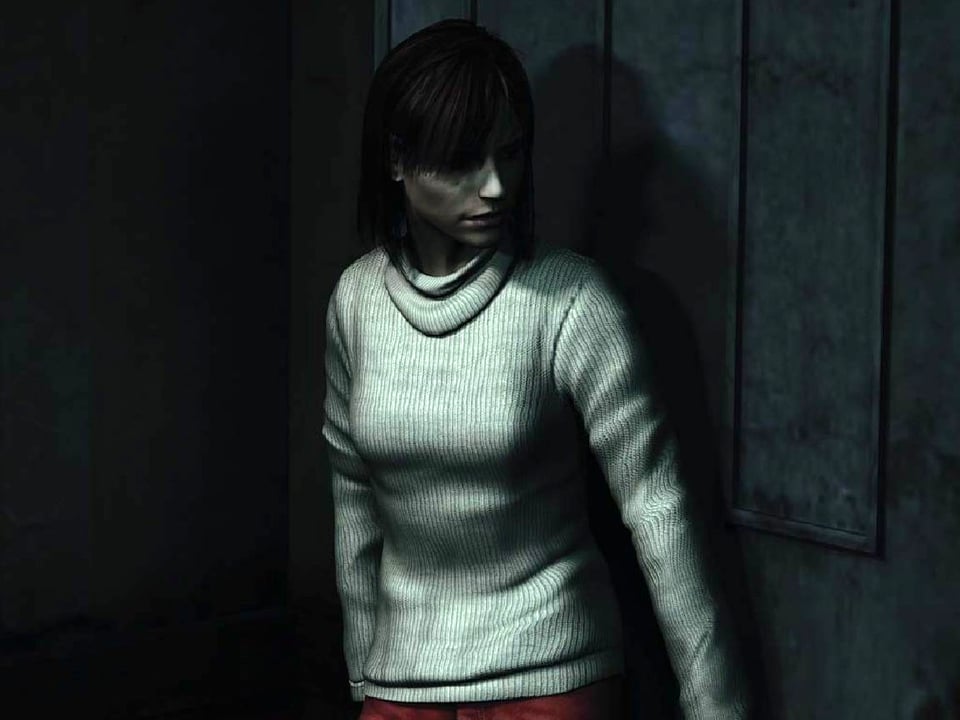
Each of these souls end up in the same place, but they see a different version of the town, a different dream for every dreamer. For Laura, surrogate daughter to Mary, there's nothing here but a sleepy resort town. For Maria, who sees what James sees, the town is blanketed by fog and crawling with monsters. For Eddie, it's always cold, his vision of the town seemingly frozen over and lousy with dead bullies as his sickening laughter catches in the air. For James, the town looks at once drowned and burned, rotting away from the inside out. For Angela, it's a world made of flesh as everything burns away in a constant blaze.
But I don't think it started in Silent Hill for her. I think that's what makes her a little different than the rest.
We're only able to see a glimpse of each version of the town throughout the game. In assuming James’ perspective, we see all these characters as extensions of his dream. Maria is the beautiful, vital wife he never had in Mary, born from both love and hatred. Laura is the hope for a child they wanted but couldn't have. Eddie is James’ tortured self-image, a nihilist who rationalizes his violence to escape blame. And Angela is his grief and self-destruction, the shadow he must overcome if he's going to make it out of the town alive.
Always held at a distance from the other characters, Angela is the most isolated among them. Eddie and Laura hang out and bicker at the bowling alley. James and Maria visit different locations across the town together. James has multiple run-ins with Eddie and Laura respectively throughout the game, changing the context of his relationships with them. Angela, however, is totally removed, and I can't really say that James’ relationship to Angela changes in the same way.
There's…a sort of implied hierarchy of reality in relation to James. Stay with me here, because I'm talking about who gets to exist outside the physical location of the town. Laura feels like the most real because she has knowledge and memories of Mary independent of James. She comes from somewhere and will return when she leaves. Eddie knows Laura (and gave her a lift into town if the opening animations are anything to go by), which means he's likely real because they interact. Maria is a manifestation of James’ subconscious desires, fears, and guilt, so only he can interact with her. Laura is known to Maria because she was known to Mary, but Laura doesn't see or interact with Maria.
Angela, on the other hand, only interacts with James. No other characters seem to be aware of her, nor does she have a connection to him outside of the town. Yet she seems to know things about James that no one else would, or can otherwise intuit the source of his guilt. You could argue that she knows about Maria, too, sensing the general nature of Maria's existence. But that's taking a leap of interpretation. What I will say is that you wouldn't be blamed for thinking that, in a town of overtly feminine creatures and a whole ass woman birthed from James’ Freudian nightmare, Angela is another haunting.
(The idea of James being visited by three women -- well, two women and a Laura -- who know he sucks in a sort of Lynchian spin on A Christmas Carol is quite tempting. Eddie complicates this read, but it's pretty fun!)
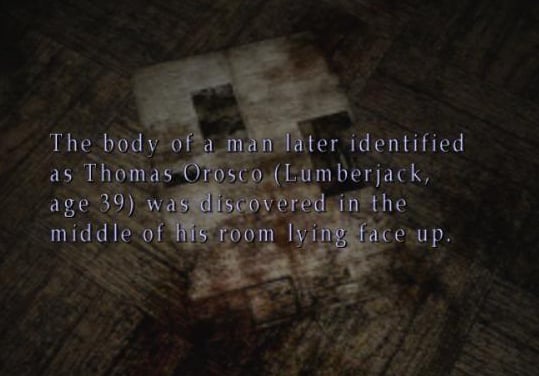
Before our next encounter with Angela, James finds a blood-soaked newspaper while roaming the halls of the labyrinth level. Silent Hill had started to warp around James at this point, taking on strange locations and impossible architecture. The stained page reports on the death of Thomas Orosco. A 39-year-old lumberjack with a history of drunkenness and violence, Thomas was found in his room stabbed to death. The weapon wasn't recovered and no cash or valuables were taken from the crime scene.
James still has Angela's knife.
Down a hallway lined with newspapers, we can hear Angela scream for her father to stop hurting her.
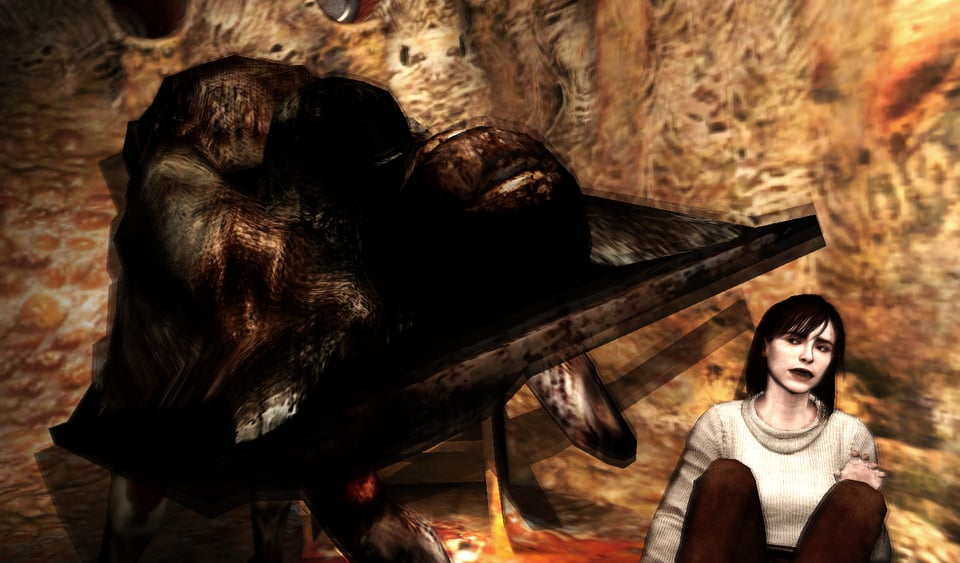
We find Angela inside a room made of flesh. The walls are lined with holes penetrated by thrusting pistons. She sits on the floor by an old CRT television set, a hauntingly normal piece of furniture in an otherwise upsetting space. A moaning, writhing thing menaces her, looking like rotted meat stretched over two figures. They appear as if together on a bed, one lying atop the other, the heads shuddering, limbs struggling beneath the tarp-like skin. Angela refers to this creature as “Daddy” and it is the only time Angela acknowledges the monsters in the town. Though we don't see what she sees, her anguish is viscerally real in Burke's screams.
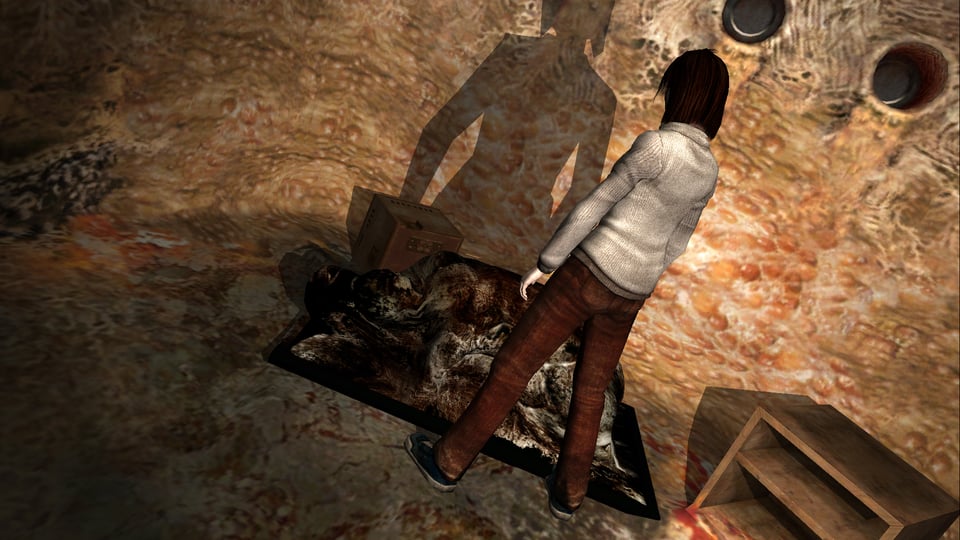
As James, you kill the monster in a fairly underwhelming boss fight. He unloads the shotgun into its form as it lurches after you, making an arena of this harrowing scene. Angela delivers the killing blow once the creature is down, bashing its head with the television set and kicking it until it stops twitching. James’ cold attempts at comfort are met with disgust rather than gratitude. She accuses him of wanting to beat and force himself on her before spitting out more accusations about Mary. Of hating his wife, cheating on her, getting rid of her. Because she knows what James is, what he really is. He can only mutter assurances to himself as Angela leaves, never asking for his help to begin with.
If James Sunderland sees devils in Silent Hill, then Angela Orosco sees something many orders of magnitude worse than that. Here he's able to peer inside the horrors of her world and see a version of the things that stalk her at night. More pointedly than that, we see that Angela is a killer. She stabbed her father to death and fled. Faced with some manifestation of him here, she kills him again. The hallway outside is lined with newspapers in a constant reminder of her very publicized crimes, while the room itself manifests the crimes against her. A lifetime of abuse in every way imaginable.
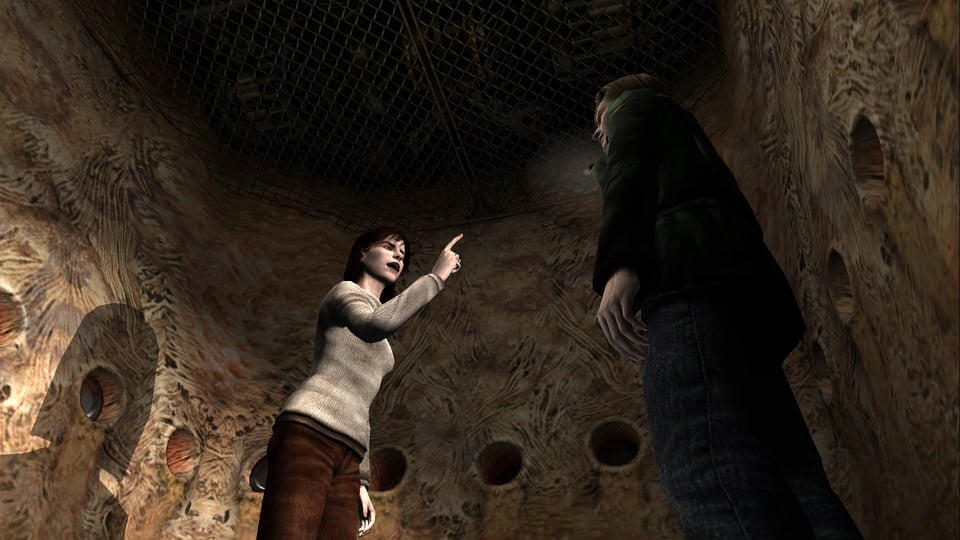
In taking James’ perspective, we see what he sees of Angela. He sees a victim, a woman to save. He even sees the monster that represents her abuse in this very lurid way, elevating the most upsetting details to spectacle. But what do we know about Angela? She comes from a working class, maybe working poor, family. She's very young, just a teenager, given her father's age of 39. Abuse has aged her, made her broken and angry. It brings an eerie quality to her child-like speech, still calling her parents “Mama” and “Daddy” and talking with a hesitant inflection.
What goes unremarked upon is that she killed her father with the kitchen knife James has been carrying for her. She kept it as she traveled to Silent Hill to find her mother. Her father and brother were thought to be here, too, but we know that at the very least she's disposed of Thomas.
So what does Angela intend to do here?
James still keeps the knife. If he looks at it too much, he kills himself at the end of the game. He has amassed a cache of weapons in his inventory, but Angela's is the only one imbued with this specific power. It can only be used for self-annihilation despite you, me, and James knowing that it was used to kill her father. It is a tool of agency and self-determination; in his hands, the weapon becomes another externalized avatar for James, with the onus of his suicidal ideation placed on her through the game's mechanics.
Angela came here with a purpose, and has become both a victim to save and a symbol of self-destruction, all without her knowledge.
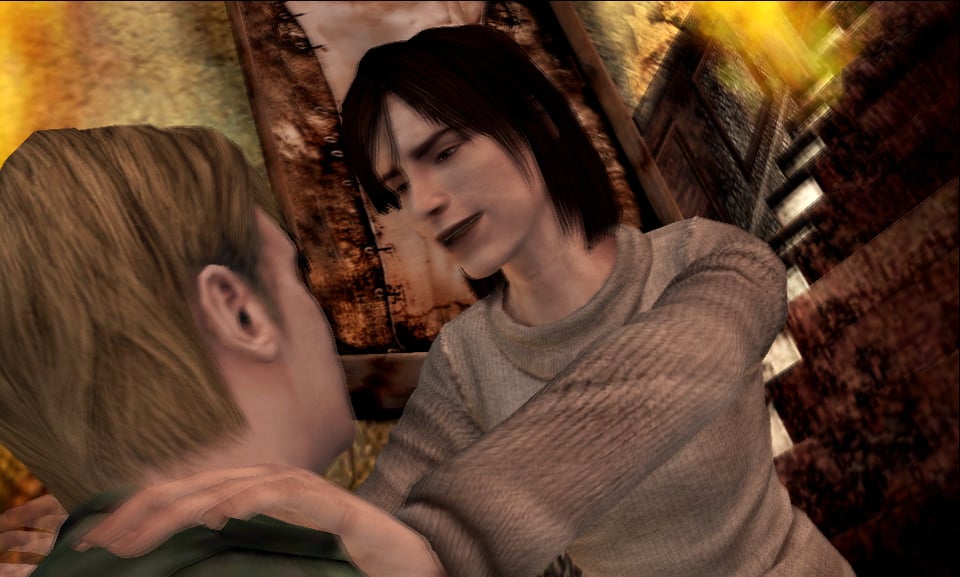
In Angela's final scene, James finds her on a staircase engulfed in flames. Maria has died and again. Eddie died at James’ hand, put down like a rabid dog. Laura has run away from James after he admitted to her, to himself, that he murdered Mary. There is no one else but Angela here at the end of things, alone in a burning room. She stands observing two canvasses mounted on the wall, each displaying human hides. The skins look like the bodies of men, the sexual organs mutilated and removed. We see now what she sees: two dead men, her own good work, in a world forever burning down.
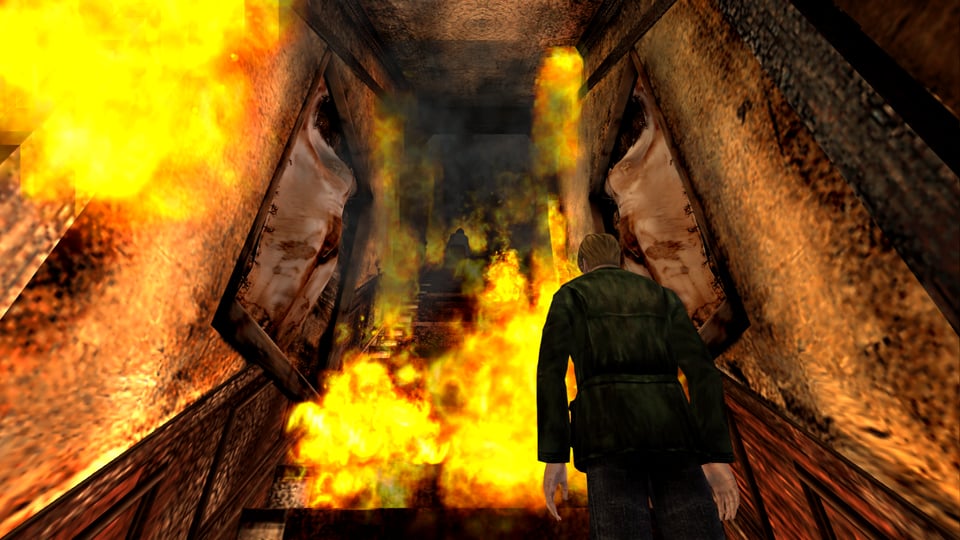
There could be room for one more canvas.
Seeing James, Angela's mood brightens. She bounds down the stairs to take his face in her hands, calling for her mama. Now everyone is all together, now she can finally rest. The sudden recognition causes her face to fall. Quick apologies follow and she thanks James for saving her, but wishes he hadn't. She wants to die. Deserves to, just like her mama always said. She always deserved everything that she got.
James tells her what he needs her to hear: that she didn't deserve to be abused, that there's another way. The camera shifts into the first person view here as James looks up at Angela on the stair above him. She asks him not to pity her, then thinks better of it. She knows what we know about James, after all. Her tone turns to poison. Did he come here to save her? To love her? To heal all her pain? The camera's view recedes as James appears to shrink, shamefully unable to meet her gaze.
Finally, she tells him to return her knife. It has one last purpose. James refuses. He trips on his instinct to save face when she asks him if he's saving it for himself. Disgusted, she turns away to retreat up the staircase. James, unable to bear the silence, comments on the flames lapping at their bodies:
“It's hot as hell in here.”
The comment gives Angela pause. She turns to ask if he can see it, too.
“For me, it's always like this.”
Watching Angela disappear behind a wall of flames, James -- you, me -- can't do anything to stop her. You probably think that this is a sad thing. I don't. And that usually gets me in trouble.
Let me just preface this next series of statements with some necessary context. I have C-PTSD from the abuse I suffered in my home growing up. I don't share Angela's story, but I knew other children who did. They were sometimes cousins, sometimes friends. For these reasons and others that are inappropriate to discuss in mixed company, Angela is…familiar to me. She looks, moves, speaks the way I felt for most of my life. It's the way she puts space between her and James whenever he moves in too closely. The stuttered apologies for her emotions, her existence, inconveniencing James. How her fear and anguish turn to rage as if swallowing her tears and spitting up acid to replace them.
How it always feels like burning alive.
Trauma does not make Angela beautiful. It doesn't turn her into an avenging angel or empowered devil. She does not suffer exquisitely in a gilded frame upon our wall, sinking in the drink among the flowers to rest beside Ophelia. Her stolen virtue isn't mourned for, either, or even brought up. Angela simply is.
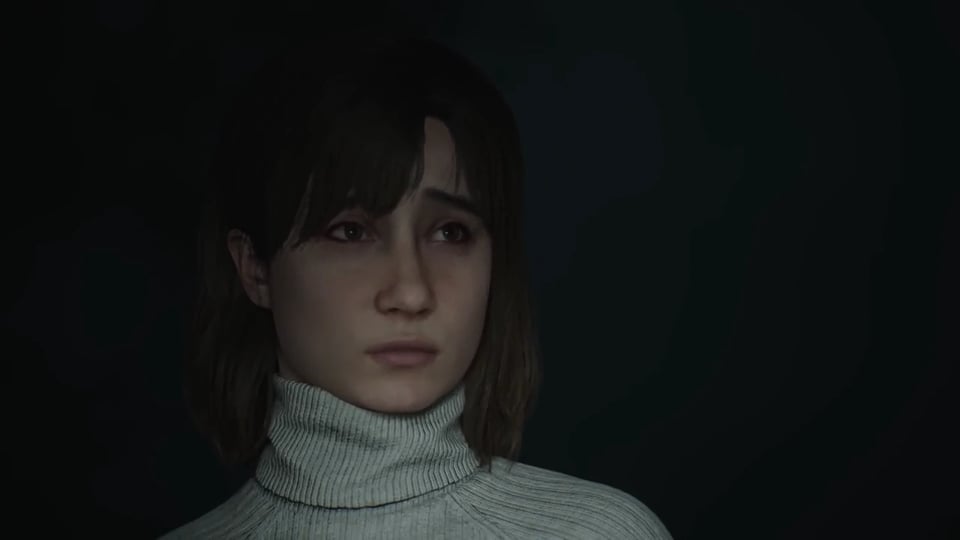
I can see the argument that her unclear age puts an unnecessary emphasis on how her appearance or youth are ruined by trauma. A past version of myself felt the same way, and I still think it's worth probing a bit. Bloober Team's 2024 remake smoothes that wrinkle by modeling Angela's new face after her performer and voice actor Gianna Kiehl. 2024's Angela is younger and softer, with Kiehl giving a far more grounded performance.
I honestly have nothing bad to say about Kiehl, for the record; I thought she brought a lot of passion and rage to Angela, and made the character her own in a really compelling way. There's something very potent in Angela, as young as she is allowed to be here, confronting James without having her appearance drawing attention to itself.

However, it's a very different kind of performance, and I can't say that I'm in love with all the changes Bloober Team made with respect to how Angela's story is represented in gameplay. So we're going to stick with 2001's Angela, and how that past version of me remembered the game very differently than I do now.
I saw Angela's grief and papered over her rage. It felt too incongruous to account for. I saw her abuse as the totality of her identity, a scarlet letter upon her chest. To me, Angela was merely sad-looking and suicidal, another tragic young woman in a story about the kinds of things that happen to tragic young women. She was unable to make peace with her past, a cautionary tale for what James could become if he didn't forgive himself. Now, currently two years on the other side of a PTSD treatment program, I can assure you that forgiveness doesn't matter here. We are so far beyond quibbling over redemption arcs.
In Silent Hill, she doesn't see monsters; she sees her family, everyone who participated in her abuse. Her father, perhaps her brother too for all that we know from inference alone, appears to haunt and attack her. Her mother's face is projected onto James with the promise of them all being united in death. Dead or alive or somewhere in between, she's looking to lead them all to their graves so she can finally rest.
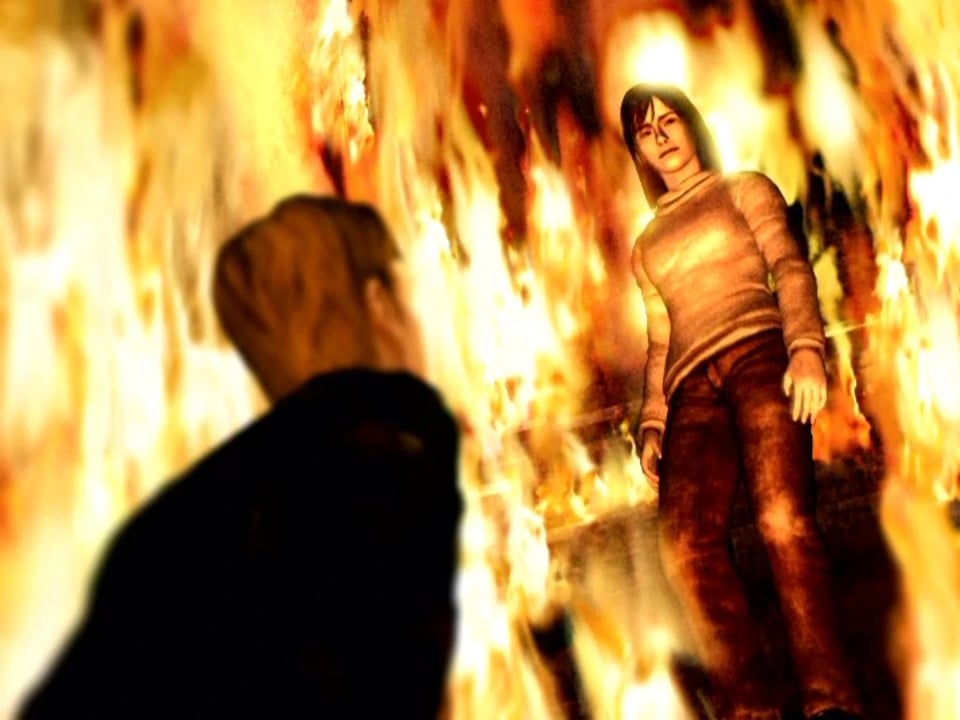
For as much as I love and mourn for Maria, Angela is just so powerful. She's so beautiful and important to me. She doesn't come to Silent Hill to be punished for her crimes but to put an end to cycles of abuse by annihilating her entire family. Yes, she hates herself and has internalized her mother's words, and that is sad. But that is a part of abuse, not an aberration. Taking the story that you're told by your abusers since you were born and making it your own is how this works. She's not weak for that; she is simply living in the same constructed reality I did. That many of us did and still are when we live inside the worlds our abusers created for us.
Angela's constructed reality bumps up against James’ throughout the game in uncomfortable ways. Through Angela, James is allowed to indulge in his projected self. He's a good guy, a caring guy, a guy who just wants to do the right thing. He meets a tragic young girl and wants to save her from herself and the world of monsters that she's created in her head. Yet she knows there's something wrong with him. Her fear of him could be seen as a fear of men in general, but I can see her reaction to him as more a matter of intuition, showing him how porous his self-image really is.
This is where I think I differ from a lot of people on the subject of Angela's final act. As audiences -- shit, as people -- we are trained to treat suicide as a moral or personal failure. Only weak people end up that way. You should be stronger. Work harder. Because if only Angela worked harder, she would see that life was worth living. Silent Hill is testing her, the way it tested Eddie and James. Like Eddie, Angela failed. That's the moral of the story: work harder to get better or die.
To be clear, if Angela was a real-life girl sitting in front of me, I would try to talk her out of it. Whatever the outcome, I would try. I would tell her that she is worthy of love and care because she exists and that is the only prerequisite for deserving life. Even if life is pain, pain doesn't define us, and there is freedom in finding life outside the stories that we were all told about ourselves. But Angela isn't real, and I think what she has to say about autonomy and choice is very important.
In a world where women bend to fit James’ vision of them, Angela does not yield. The monsters are contorted figures of bound women wrapped in latex or pairs of legs sewn together. Mary's nurses during her hospital stay manifest without faces and wearing heels in short revealing uniforms. Maria herself is made to suit James’ unspoken tastes. Even Laura, if you get the “good” ending, forgives James and leaves the town with him, skipping and playing along as they go. Angela, shaking with rage and grief, is fashioned of her own will.
To take this one step further, Angela does not simply act as a foil to James. They run on parallel tracks, each looking for a loved one, each a killer in their own way, each struggling with the choice whether to live or die. But I see Angela's role in the story, a dreamer who dreams of her own Silent Hill, as the most thematically impactful.
Like Pyramid Head, representative of an executioner from the depths of the town's bloody history, James assumes a position as judge both inside and outside the dream. He decides who lives, dies, and who's telling the truth. Eddie? Dead. Laura? Her existence pokes holes in his version of events, and so he is hostile toward her. Maria? We all know what happened to her. And Angela? She gets to be saved because he can save her. Her life as a victim is valuable because it reinforces the narrative that he's a good person.
But James kills Mary. He denied her will and agency in killing her rather than her passing naturally, peacefully, at home. She returned from hospice care for the last time, and that was when he decided to murder her. Despite her muffled screams and struggling. Despite her asking for comfort and reassurance in her final weeks or months. He made the choice to end her life so that he could be the one to do it. By his own admission to the ghost of his dead wife in the final stretch of the game, hatred and resentment motivated at least part of his actions.
He's a man who chooses when a woman -- his wife -- lives and dies.
Angela is a young woman who was never allowed agency within her life. Abused, neglected, and tormented, the shape of her life -- her sense of self, of reality -- was dictated by her abusers. The nuclear family is a machine designed to serve capital and patriarchy, and it did everything it could to destroy her. Now, finally, her life and body are hers to do with what she wants.
If at the end of her journey, she resigns herself to the non-existence of death, it's her choice to make. It's a measured choice in her final scene, when she's calm and in control of her emotions. This isn't a choice made in a fit of despair or shame for what she's suffered through. Yes, she's young, only a teenager, but this life is hers to do with what she wishes.
James cannot make that choice for her. He can't protect her from her own will. We can't protect her from it. You or me or James, none of us can take that choice for her. And it is a choice, as wrenching as it is, to definitively assert control over herself after having it stolen again and again. That is why her story has come to mean so much to me after all these years.
“For me, it's always like this.”
Her death is not a loss state. It isn't a failure. It's a battle with herself and you and me and James Sunderland and our whole goddamn society. She chose the fate that made the most sense to her, wanting no other future. And she was allowed to have it as she climbed the flaming stairs and exited the dream forever.
Angela does not perform hope and healing for you. She doesn't “owe” you that happy ending because you played the game “the right way.” She is ugly and off-putting the way trauma makes you ugly and off-putting. Silent Hill hasn't called her here to facilitate her punishment because, in my book, she hasn't done anything wrong. This isn't about punishment or redemption but the fact that sometimes the best choice is the one we don't want to entertain. Sometimes an exercise of will and autonomy doesn't feel good.
Is it “moral”? “Instructive”? “Life-affirming”? Does it make you feel better about the world? No. It isn't, and it doesn't. But it is a haunting and powerful story that leaves me feeling profoundly moved every time I sit with it. I don't need Angela to tell me that it's all going to be okay. I'm capable of finding that resolve within myself, through therapy, medication, and a lot of trying every single day.
I've given myself the power not to be taken in by other people's stories about me. In her story, the one she finally gets to tell, I find a sense of peace. That means more to me than any reassurance or lesson learned. Especially when taking popular discussions about this game into account and how they frame the women and girls in it. How Mary's murder was actually justifiable, how Maria is actually the villain of the story, how Laura is a prize James deserves to win. How all of these arguments work together to absolve James within the context of the story, the way society works for men in our own lives.
There will always be an Angela out there, for whom the world is aflame, no matter how we try to talk ourselves out of that knowledge. I just want to sit with her for a while and listen to what she has to say. I think she's earned that much.
-
You offer some of the best alternative introspection to games and media, and I adore it. Incredible work, thanks for writing and inspiring deeper thought in beautiful work!
Add a comment: